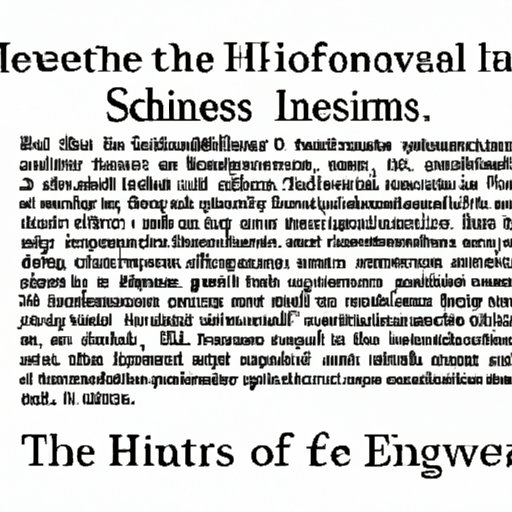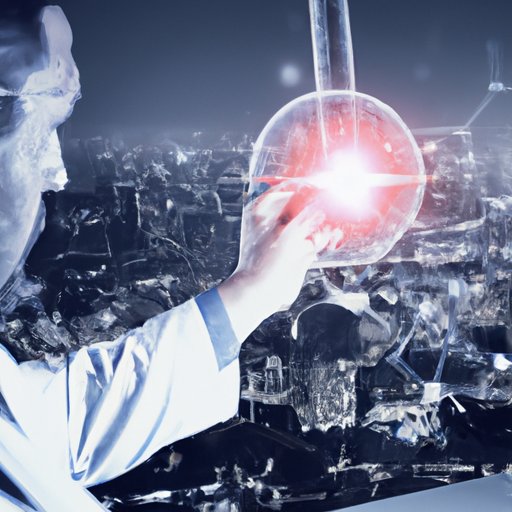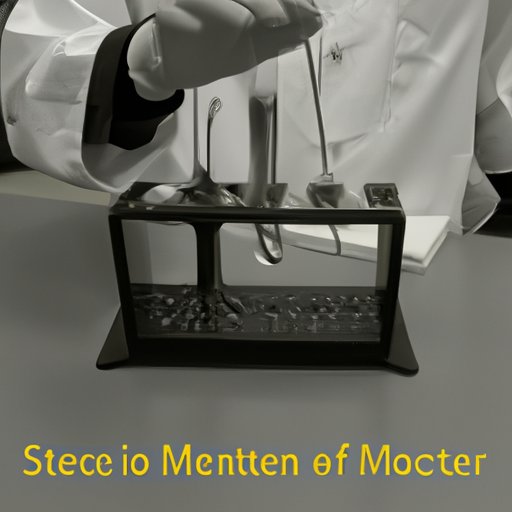Introduction
Science is defined as the systematic study of the structure and behavior of the physical and natural world through observation and experiment. From this definition, it’s clear that science plays an important role in understanding the world around us. But what exactly does science explain? This article will provide an overview of the history of scientific discoveries, the role of technology in explaining scientific concepts, and the impact of science on society. Additionally, it will explore the scientific method and its application to everyday life.

A Historical Perspective on What Science Explains
Throughout history, scientific discoveries have been made that have helped to explain the world around us. Ancient civilizations such as the Babylonians, Egyptians, and Greeks all made significant contributions to scientific knowledge. For example, the Babylonians developed the first known astronomical observatories and created mathematical models to predict the movements of the planets. The Egyptians also developed advanced mathematics and engineering, which enabled them to build the pyramids and other monuments. Meanwhile, the Greeks developed theories about the nature of matter, motion, and the universe.
In the early modern period, scientists such as Galileo Galilei and Isaac Newton made groundbreaking discoveries in the fields of mathematics, physics, and astronomy. Galileo was the first to use a telescope to observe the night sky, while Newton developed the laws of motion and gravity. These discoveries laid the foundation for modern science and enabled scientists to make further advancements in their understanding of the physical world.
Today, scientists are continuing to make remarkable discoveries that help to explain the world around us. Advances in technology have enabled scientists to explore the universe in unprecedented detail. For example, NASA’s Hubble Space Telescope has provided us with stunning images of galaxies and nebulae, while the Large Hadron Collider has allowed us to explore the subatomic world. These discoveries have helped to expand our understanding of the universe and our place within it.
The Role of Technology in Explaining Scientific Concepts
Technology has played an important role in helping scientists to explain scientific concepts. Computers have enabled researchers to store and analyze vast amounts of data, making it possible to uncover new insights. Sensors have also been used to collect data from a range of sources, including the environment and human subjects. Robotics has also been used to automate the analysis of data, allowing scientists to quickly identify patterns and trends.
In addition, 3D printing has been used to create physical models of complex structures, such as proteins and enzymes. This has enabled scientists to better understand the molecular structure of these substances and how they interact with each other. Virtual reality has also been used to simulate real-world scenarios, such as the effects of climate change or the spread of disease. This has enabled researchers to gain a better understanding of how certain phenomena occur.

Examining the Impact of Science on Society
In addition to providing insight into the workings of the natural world, science has had a tremendous impact on society. On the positive side, scientific discoveries have enabled us to develop technologies that have improved our lives. For example, medical advances have led to longer life expectancies and more effective treatments for diseases. Meanwhile, technological innovations such as the internet and mobile phones have enabled us to communicate more easily and access information more quickly.
On the negative side, some scientific discoveries have had unintended consequences. For instance, the development of nuclear weapons has raised the specter of global annihilation. Additionally, advances in genetic engineering have opened up the possibility of unethical uses of this technology. Finally, the burning of fossil fuels has had devastating environmental consequences, such as climate change.
However, science can also be used to improve society. For example, scientific research can be used to develop renewable energy sources that are less damaging to the environment. Additionally, scientific studies can be used to inform public policy decisions, such as measures to reduce air pollution or promote public health. By leveraging the power of science, we can create a better future for ourselves and future generations.

Exploring the Scientific Method and Its Application to Everyday Life
The scientific method is a process that scientists use to investigate phenomena and reach conclusions. It consists of five steps: observation, hypothesis, experimentation, analysis, and conclusion. In the observation stage, scientists observe a phenomenon and record their observations. In the hypothesis stage, they form a testable hypothesis based on their observations. In the experimentation stage, they conduct experiments to test their hypothesis. In the analysis stage, they analyze the results of their experiments. Finally, in the conclusion stage, they draw a conclusion based on their analysis.
The scientific method can also be applied to everyday life. For example, if you’re trying to decide between two different job options, you could use the scientific method to make your decision. First, you would observe the pros and cons of each option. Then, you would form a hypothesis about which job would be best for you. Next, you would conduct experiments to test your hypothesis, such as talking to people who work in each field or researching salary information. Finally, you would analyze your results and make a conclusion about which job is best for you.
Conclusion
This article has explored the role of science in our lives and what science explains. We examined the history of scientific discoveries, the role of technology in explaining scientific concepts, and the impact of science on society. Additionally, we looked at the scientific method and its application to everyday life. Ultimately, it’s clear that science plays an important role in understanding the world around us and can be used to improve society.
(Note: Is this article not meeting your expectations? Do you have knowledge or insights to share? Unlock new opportunities and expand your reach by joining our authors team. Click Registration to join us and share your expertise with our readers.)
